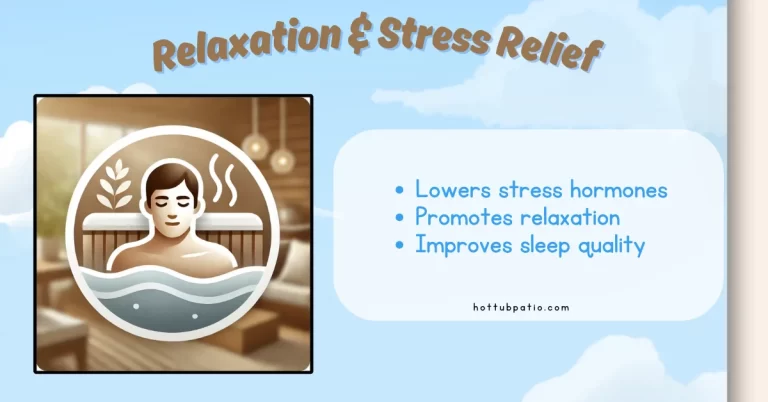If you’ve ever wondered whether using a hot tub is truly good for your health—or if it might bring some risks along the way—you’re not alone. Maybe you’re concerned about how it could affect your heart, your skin, or even your recovery after a tough workout.
You could also be weighing the benefits of a saltwater hot tub over a bromine-treated one, or questioning whether the relaxation you feel comes with hidden drawbacks. Whatever the case, it’s normal to have these questions.
You’ll leave with the answers you’re looking for—and maybe even discover a few benefits you hadn’t considered before.
The Surprising Health Benefits of Hot Tubs:
Hot tubs have become a staple in relaxation and luxury living. Not just a symbol of opulence, they are a sanctuary for those seeking a momentary escape from the hustle and bustle of daily life. Hot Tub Patio, your ultimate source for relaxation and outdoor living insights, explores hot tubs’ multifaceted health benefits when used responsibly.
Beyond their allure, hot tubs are a fountain of health benefits, promoting everything from relaxation to improved cardiovascular health when utilized with care.

Relaxation and Stress Relief
The soothing embrace of warm water and the gentle support it offers through buoyancy can act as a balm for frayed nerves and tired muscles. Here’s how:
- Warm Water and Buoyancy Promote Relaxation: The warmth of the waterworks to relax muscles, while buoyancy reduces the strain on them, creating a unique environment for stress relief.
- Reduction of Stress Hormones: Soaking in a hot tub can lower cortisol levels, a stress hormone, aiding in a calmer state of mind.
- Improved Sleep Quality: When exiting the tub, the temperature transition can help facilitate a deeper, more restful sleep.
Pain Relief
Hot tub therapy, or hydrotherapy, has been recognized for its efficacy in pain management:
- Muscle Relaxation and Blood Flow: The heat from the water helps to relax muscles and increase blood flow, easing muscle tension and pain.
- Relief for Chronic Conditions: Individuals with back pain, arthritis, and joint stiffness often find significant relief through regular hot tub use.
- Increased Range of Motion: Improved flexibility and mobility are notable benefits, thanks to the relaxing properties of hot water.
Cardiovascular Health
A heart-healthy lifestyle might just include regular dips in the hot tub:
- Increased Heart Rate and Circulation: Like mild exercise, hot tub use increases heart rate and improves blood circulation.
- Potential Blood Pressure Benefits: Studies suggest that soaking in a hot tub can temporarily lower blood pressure.
- Enhanced Circulation: Particularly beneficial for those with diabetes or peripheral artery disease, improving overall cardiovascular function.
| Benefit | How it Helps | Conditions Benefited |
|---|---|---|
| Stress Relief | Lowers stress hormones and promotes relaxation | General stress, anxiety |
| Muscle Relaxation | Relaxes tense muscles and eases soreness | Post-exercise recovery |
| Improved Sleep | Regulates sleep cycles, eases insomnia | Insomnia, sleep issues |
| Pain Relief | Reduces inflammation and joint pain | Arthritis, fibromyalgia |
| Cardiovascular Health | Lowers blood pressure, improves circulation | Heart health |
Respiratory Benefits
The steam rising from a hot tub can do more than just warm the air:
- Clearing Nasal Passages: The warm, moist air helps open and clear nasal passages and sinuses.
- Improved Lung Function: Individuals with respiratory conditions may find breathing more accessible, thanks to improved lung function from the steamy environment.
Mental Health
The mental health advantages of hot tub use are as warming as the water itself:
- Mood Enhancement: The relaxation and comfort provided by hot tubs can significantly improve mood and reduce symptoms of depression and anxiety.
- Social Interaction: Sharing a hot tub with friends or family can offer social benefits, fostering connections and reducing feelings of loneliness.
Improved Insulin Sensitivity
For those managing diabetes, regular use of a hot tub may improve insulin sensitivity. Thermal therapy through hot water immersion has been shown to potentially aid glucose regulation, though it should not replace medical treatments.
Calorie Burn
Might help burn calories. While it won’t replace a good workout, a study showed that relaxing in warm water can burn about the same number of calories as a 30-minute walk. That said, it’s best seen as a complement to exercise rather than a substitute.
Precautions and Safety
While the benefits are plentiful, safety should never take a backseat:
- Time and Temperature: Liming soaking time and avoiding scorching temperatures is crucial to prevent overheating.
- Hydration and Alcohol: Staying hydrated is vital, and alcohol should be avoided before and during hot tub use to prevent dehydration.
- Medical Consultation: Those with medical conditions should consult a healthcare professional before using a hot tub.
The Risks: Who Should Avoid Hot Tubs?
1. Public Hot Tub Risks:
- Outbreaks: Between 2015-2019, the CDC reported 208 water-related outbreaks involving public swimming pools, hot tubs, and water playgrounds, leading to over 3,646 illnesses, 286 hospitalizations, and 13 deaths.
- Hotels/Resorts: 70% of water-related outbreaks at hotels and resorts were linked to hot tubs.
2. Health Complications:
- Heart Disease: Hot tubs can strain the heart, especially for those with heart disease, leading to low blood pressure, dizziness, or even heart attacks.
- Pregnancy Risks: Pregnant women are at risk, particularly in the first trimester, due to the risk of overheating, which could harm fetal development.
- Substance Use: Alcohol or drug use in hot tubs can lower blood pressure, increase the risk of fainting, and lead to dangerous situations like drowning.
3. Bacterial Infections:
- Pseudomonas: This bacteria can cause hot tub rash (folliculitis) and infections such as swimmer’s ear.
- Cryptosporidium: This parasite causes gastrointestinal infections and thrives in unclean hot tubs.
- Legionella: Known for causing pneumonia (Legionnaire’s disease), it can be transmitted through contaminated hot tub mist.
4. Safety Tips:
- Avoid swallowing hot tub water.
- Keep hot tubs below 104°F.
- Shower before entering the tub.
- Stay hydrated and avoid alcohol before or during use.
5. Special Considerations:
- Elderly: Seniors with heart conditions, diabetes, or other medical issues should be cautious.
- Children: Should avoid hot tubs or only use them at lower temperatures for short periods.
Maximizing the Benefits of Your Hot Tub
Incorporating these tips into your hot tub routine will enhance both relaxation and health benefits while ensuring your sessions are safe and comfortable. To ensure you get the most from your hot tub experience, it’s important to consider factors such as temperature, duration, and post-use care.
How to Benefit from Your Hot Tub Session
- Ideal Water Temperature for Maximum Benefit
- The recommended water temperature is between 100°F and 104°F (38°C – 40°C). For most people, this range offers the best balance between relaxation and safety. If you have a health condition, consider lowering the temperature to around 98°F to avoid unnecessary strain.
- How Long Should You Stay in a Hot Tub?
- Limit your hot tub session to 15-30 minutes. Staying in too long can raise your core body temperature, leading to dizziness or dehydration. If you feel uncomfortable or light-headed, it’s best to exit the tub and cool down.
- Tips for Post-Workout Recovery
- After a workout, soaking in a hot tub can help relax muscles and reduce soreness. The heat increases blood flow, which can speed up recovery. Just make sure to wait about 30 minutes after exercising before entering the hot tub to allow your body to cool down naturally first.
Healthy Hot Tubbing Tips
- Frequency of Use: Is it Okay to Use Your Hot Tub Every Day?
- It’s generally safe to use your hot tub daily as long as you stay mindful of water cleanliness and your own health. However, if you have sensitive skin or health conditions, consult with a healthcare provider to determine a safe usage schedule.
- Avoiding Dehydration: How to Hydrate Before and After Soaking
- Hydrate with plenty of water before and after using the hot tub. The heat from the tub can cause you to sweat, which leads to fluid loss. Keep a bottle of water nearby and sip throughout your session to prevent dehydration.
- Maintaining Skin Health: How to Protect Your Skin from Irritation
- The chemicals in hot tub water can dry out your skin. To avoid irritation:
- Rinse off before and after using the hot tub.
- Use a moisturizer after your soak to restore your skin’s moisture.
- If you experience frequent skin irritation, consider adjusting the water’s pH level to a more skin-friendly range.
- The chemicals in hot tub water can dry out your skin. To avoid irritation:
Saltwater vs. Bromine Hot Tubs: Which Is Better for Your Health and Skin?
Both options have their benefits, but if you have sensitive skin or want a more natural soaking experience, a saltwater hot tub may be the better choice. For those who prioritize disinfection and ease of maintenance, bromine remains a solid option.
- Saltwater Hot Tubs: These are gentler on the skin compared to bromine or chlorine. They offer a more natural feel, with less chemical odor, and can help reduce the risk of skin irritation.
- Bromine Hot Tubs: More stable in higher temperatures and offers strong disinfecting properties. However, it may cause dryness or irritation for those with sensitive skin.
Special Health Benefits for Different Needs
If you’re looking for a more soothing, muscle-focused recovery, a jacuzzi is likely the better option. For a more intense detox and overall stress relief, a sauna might be the way to go. Both options provide excellent health benefits, so it largely comes down to personal preference and specific needs.
Benefits for Skin: From Hydration to Detoxification
Hot tubs can improve skin health, but it’s important to balance the right conditions to avoid irritation.
- Hydration: Soaking in warm water helps open pores and hydrate the skin. The increased blood circulation from the heat delivers nutrients to the skin, giving it a healthy glow.
- Detoxification: Sweating in the hot tub can help flush out toxins through your pores. To maximize this effect, keep the water clean and consider rinsing off after a soak to remove any impurities that were released.
- Soothing Dry Skin: If you add moisturizing oils or use a lower chemical alternative like a saltwater hot tub, your skin will retain more moisture. Always apply a gentle moisturizer after soaking.
Benefits After a Workout: Faster Muscle Recovery and Less Soreness
- Muscle Recovery: Soaking in a hot tub after exercise can relax muscles, reduce stiffness, and ease soreness. The heat increases blood flow to your muscles, which can promote healing and reduce inflammation.
- Joint Relief: The buoyancy provided by the water can relieve pressure on joints, making it an ideal recovery tool for those dealing with arthritis or other joint issues.
- Improved Flexibility: Regular hot tub sessions can also improve flexibility by loosening up tight muscles and allowing for greater movement.
Outdoor Hot Tub Health Benefits: The Extra Boost of Relaxation from Soaking in Nature
Soaking in an outdoor hot tub adds an extra level of relaxation by combining hydrotherapy with the healing powers of nature.
- Mental Health Boost: Being outside while soaking in a hot tub can reduce stress and improve mental well-being. The combination of nature’s calming effect and the warm water creates a tranquil environment that helps melt away anxiety.
- Fresh Air: Breathing in fresh outdoor air while relaxing in your hot tub can enhance your overall experience, providing a more invigorating atmosphere.
- Natural Detox: The combination of fresh air and hot water can encourage deeper breathing, helping with respiratory health and providing a holistic detox experience.
Jacuzzi vs. Sauna Health Benefits:
Both are excellent for stress relief and detoxification, but each offers distinct benefits. Comparing the Pros and Cons of Both for Stress Relief and Detox.
| Feature | Jacuzzi (Hot Tub) | Sauna |
|---|---|---|
| Stress Relief | Warm water and jets reduce stress and relax muscles. | Dry heat relaxes muscles but is less immersive. |
| Muscle Recovery | Jets target sore muscles for faster recovery. | Boosts circulation but doesn’t focus on muscles. |
| Skin Health | Hydrates skin but chemicals need balance. | Opens pores but can dry out skin. |
| Detoxification | Promotes mild detox through sweating and relaxation. | Intense detox through heavy sweating. |
| Best for | Relaxation, muscle recovery, skin hydration. | Intense detox, circulation, stress relief. |
Choosing the Right Hot Tub Experience for Your Needs
If you’re unsure whether to go for a jacuzzi or sauna, think about your personal goals: for targeted muscle recovery and stress relief, the jets of a hot tub may be more effective, while a sauna might be your go-to if you’re aiming for intense detox and circulation improvements.
Hydration and balanced maintenance are key to getting the most out of your soak while keeping your skin healthy and irritation-free.
To explore more tips and find the perfect hot tub for your wellness routine, head over to Hot Tub Patio. Get ready to unwind and boost your health at the same time!
What’s your favorite way to relax—do you prefer the gentle warmth of a hot tub or the deep heat of a sauna? Let us know in the comments!






